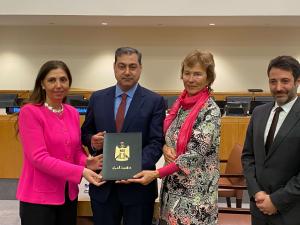
Iraq today made history as the first country in the Middle East to join the Convention on the Protection and Use of Transboundary Watercourses and International Lakes (known as the UN Water Convention). It becomes the 49th Party to this unique international legal and intergovernmental framework, which aims to ensure the sustainable use of transboundary water resources by facilitating cooperation across borders. 19 of the 22 Arab countries are considered water scarce. Nearly all Arab States draw upon transboundary water resources that cross one or more international boundaries.
The Tigris and Euphrates Rivers Basins are the most important sources of surface water for some 237 million people across Iraq (43.5 million), Iran (88 million), Syria (21 million) and Türkiye (85 million). The rivers system, including their many tributaries, is essential to Iraq, and its riparian States. But competing needs of water for irrigation, drinking water supply (only some 60% of the population has access to safely managed drinking water services), industry, hydropower production and the environment, combined with diminishing water quantity and deteriorating water quality, pose difficult management challenges. These challenges are exacerbated by the impacts of climate change.
Facing high water stress, Iraq is experiencing mounting social, economic and political pressures due to water scarcity. Low rainfall, increasing temperatures and reductions in the country’s surface water have all led to critically low levels of water in Iraq in recent years. Transboundary cooperation is therefore increasingly important to promote sound management of the country’s transboundary water resources, to contribute to its sustainable development and to enhance regional stability and peace.
“Iraq faces a real water crisis”, warned the President of the Republic of Iraq, H.E. Abdul Latif Rashid at the UN Water Conference, who recalled that over the last 40 years water flows from the Euphrates and Tigris, which provide up to 98% of Iraq’s surface water, have decreased by 30 to 40%. He cited challenges including impacts on agriculture and the health of the citizens from drinking saline and polluted water, and the drying out of UNESCO World Heritage-listed marshlands. “At present no basin-wide arrangement consensus exists among riparian countries regarding the management of Euphrates and Tigris… I strongly encourage all the countries to follow Iraq in acceding to both the 1997 United Nations Convention on the Law of Non-Navigational Uses of International Watercourses and the 1992 Convention on the Protection and Use of Transboundary Watercourses and International Lakes”.
Ms. OIga Algayerova, UNECE Executive Secretary, welcomed this important step. “I congratulate Iraq, the first country in the Middle East to accede to the Water Convention. This opens new opportunities to enhance transboundary water cooperation. With 153 countries sharing water resources worldwide, water cooperation is a critical issue for the entire sustainable development agenda. I encourage governments in all regions to join the UN Water Convention.”
Mr. Ghulam Mohammad Isaczai, United Nations Deputy Special Representative for Iraq, Resident and Humanitarian Coordinator, emphasized that “Water must be shared at all levels: globally; regionally; between countries; and between men and women at the community level. It must be a source of cooperation rather than conflict. The Water Convention is an additional asset for Iraq to improve the management of its shared water resources for future prosperity, sustainable development and peace.”
Ms. Rola Dashti, Executive Secretary of the United Nations Economic and Social Commission for Western Asia (ESCWA), stated, “Iraq’s decision to accede to the Water Convention sends positive signals to the international community and to investors. Iraq is now Party to both UN water conventions and I am confident that this will foster cooperation in the region.”
UN Secretary-General António Guterres this week urged all Member States to join the Convention and ensure its full implementation, and has stressed that “the 1992 Water Convention is a powerful tool to advance cooperation, prevent conflicts and build resilience”.
Iraq’s accession follows that of Nigeria on 22 March 2023. Some 10 states have committed to join the UN Water Convention at the milestone UN Water Conference, where water cooperation is a major theme. More than 20 countries worldwide are in the process of joining the Water Convention.
The Water Convention, whose secretariat is serviced by UNECE, is a unique and widely accepted intergovernmental legal framework. It requires Parties to prevent, control and reduce negative impacts on water quality and quantity across borders, to use shared waters in a reasonable and equitable way, and to ensure their sustainable management through cooperation. Parties bordering the same transboundary waters are obliged to cooperate by concluding specific agreements and establishing joint bodies.

